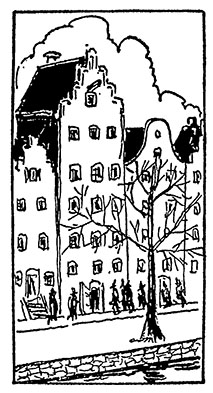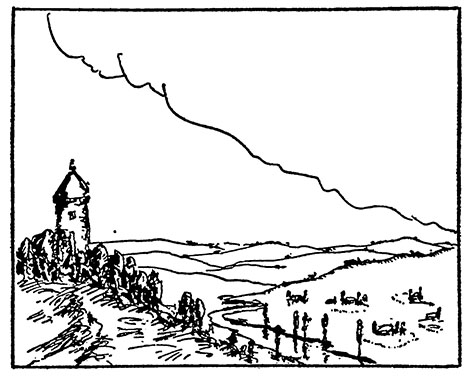Chapter 19 18. Montaigne
It has been said that the air of medieval cities was good for freedom.
indeed so.
Those who hide behind high stone walls can safely sneer at barons and priests.
Soon after, conditions on the Continent improved considerably, and international commerce became possible again, thus giving rise to another historical phenomenon.
Expressed in three two-character phrases: business benefits tolerance.
You can change this argument any day of the week, especially on Sunday.
Winesburg and Ohio could support the Ku Klux Klan, but New York could not.If New Yorkers started a movement to expel all Jews, all Catholics, and foreigners, Wall Street would be in a mess, the labor movement would explode, and everything would be in ruins.
This was the case in the second half of the Middle Ages.Moscow is the seat of a small count who looks like a duke, which can annoy Protestants; but in Novgorod, the center of international business, you need to be careful, otherwise you will annoy the Swedish, Norwegian, Germanic and Buddhist who come to do business. Lanman merchants, drive them to Visby.
A purely agricultural country could entertain its peasants with a complete set of hearty meals.But if the Venetians, Genoese, and Brugges started slaughtering heretics within his walls, there would be an immediate exodus of the representatives of the foreign companies, and the withdrawal of funds, leaving the city bankrupt.
Many countries failed to learn fundamental lessons (such as Spain, the Papacy, and the Habsburg territories), but were still swayed by the so-called "loyalty to the faith" and ruthlessly drove out the enemies of the faith.As a result, they either vanished or were reduced to seventh-tier countries.
However, those in charge of commercial countries and cities usually respect the established facts and know their own interests, so they strictly maintain neutrality in the spiritual world, and Catholic, Protestant, Jewish and Chinese patrons can do business as usual while remaining loyal to their respective religions.

lord in the attic
For the sake of outward decency, Venice passed a law against Calvinism, but the cabinet of ten carefully told the gendarme that this law should not be enforced too seriously, and that the believers should do their own thing and believe in whatever they want. Unless they actually take San Marco to their own meeting place.
So did their buddies in Amsterdam.Every Sunday, Protestant priests denounced the sins of "lewd women."But in the side street, too, the hideous Catholics are silently celebrating Mass in an inconspicuous house, guarded by a Protestant sheriff outside, lest zealots of the Geneva Religious Handbook intrude on this forbidden meeting, throwing useful French and Italian guests were scared away.
This is by no means to say that the people of Venice and Amsterdam are no longer faithful disciples of their venerable Church.They lived as they did, and were still good Catholics or Protestants.But they remembered that the good will of ten heathen merchants in Hamburg, Lübeck, or Lisbon was worth more than the permission of ten shabby priests in Geneva or Rome, and they did so cheaply.
It is far-fetched to connect Montaigne's liberal views (not always one) with his father and grandfather's herring business and his mother's Sephardic descent.However, as far as I can see, the merchant elders had a great influence on Montaigne's views.His whole life as a soldier and a statesman was characterized by a deep aversion to bigotry and bigotry, which had its origins in a small fish shop not far from the main port of Bordeaux.
Montaigne would not have thanked me if I had said this to his face, since all traces of "business" had been carefully erased from the ornate family coat of arms when he was born.
His father acquired the property of Montaigne, and spent money indiscriminately, trying to make his son a gentleman.As soon as Montaigne could walk, his poor little brain was filled with Latin and Greek by private tutors.At the age of six he was sent to high school, and before he was twenty he was a full-fledged member of the Bordeaux City Council.
Then he joined the army and worked in the courts.At the age of thirty-eight his father died, and he withdrew from all outside activity, spending the remaining twenty-one years (barring a few short-term political interventions against his will) on his horses, dogs, and books, and all studied.
Montaigne can be called an epoch-making figure, but he has several weaknesses.He was never entirely free of certain feelings and manners which the fishmonger's grandson believed to be true gentlemanly manners.He said till the end of his life that he was not really a writer, but just a country gentleman who had nothing to do in the winter and jotted down a few rambling thoughts of a slightly philosophical content.This is all nonsense.If ever there was one man who dedicated his whole heart and soul, virtue and vice and all to his book, it was this cheerful gentleman who could rival the immortal Dartaon.
Since heart, soul, virtue, and sin belonged to this generous, well-bred, and agreeable character, the corpus of his writings, above all literature, has developed into definite philosophies of life, which are written with common sense and practical wisdom. Everyday decency as a basis.
Montaigne was born a Catholic and died still the same. When he was young, he joined the Catholic aristocratic alliance formed by the French aristocracy to drive Calvinism out of France.
In August 1572, Pope Gregory VIII celebrated the murder of 3,000 French Protestants, a fateful day, and Montaigne left the Catholic Church forever.He never joined the other party, and continued to attend certain great ceremonies so as not to be garrulous, but since the night of the massacre at St. Bartholomew all his writings have been associated with Germany, or a dozen other Greco-Roman philosophers, in the same vein.There is a memorable piece entitled "On the Liberty of Conscience," in which he speaks as if he were a contemporary of Pericles in ancient times, rather than a servant of Catherine de' Medici, Queen of France. , he also used the example of Julian the Apostate to illustrate the performance that a truly tolerant politician should achieve.

Montaigne
The article is short, five pages at best, and you can find it in Chapter 19 of Book Two.
Montaigne was tired of the absolute liberty advocated by many die-hard Protestants and Catholics, which (in the circumstances) would only lead to new civil wars.But as soon as conditions permit, those Protestants and Catholics no longer sleep with two daggers and pistols under their pillows, a wise government should try to avoid interference with other people's thoughts, and should allow all subjects to obey according to the best ability of their minds. The way to get happiness is to love God.
Montaigne was neither the only nor the first Frenchman to come up with this idea and boldly publicize it.As early as 1560, Catherine de' Medici's ex-minister, Michael de Haupital, and several graduates of Italian universities (thus suspected of being Anabaptist) I once said that it is only appropriate to use words to argue against heretics.His astonishing point is that conscience has its own true face, which cannot be changed by force.Two years later he brought about the Royal Acts of Toleration, which gave the Huguenots the right to hold their own congregations and hold synods to discuss the affairs of their own religion, as if they were a free and independent sect rather than a dependent small faction.
Jean Baudin, the Parisian lawyer, was a respectable citizen (he defended private property against the communist tendencies expressed in Thomas More), and his views were similar, denying the king the right to use force to compel his subjects into this or that church.
The speeches of ministers and the treatises of political philosophers were seldom popular, but Montaigne's book was read, translated, and discussed among civilized men assembled under the name of the Symposium of Wise Men, and continued for three hundred For many years.
His amateur status and the claim that he wrote only for fun endeared him to the masses; otherwise people would never buy (or borrow) a book officially classified as "philosophy".

lord in the attic

Montaigne
